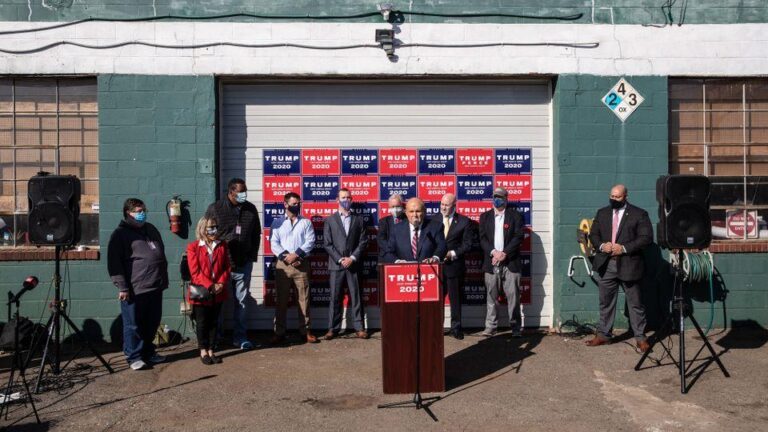The Four Seasons Total Landscaping Press Conference: A Symbol of Modern Political Chaos
How an Unlikely Location Transformed Political Messaging
What began as a seemingly absurd prank—the choice of Four Seasons Total Landscaping as the venue for a high-profile press conference—quickly evolved into a defining moment in political communication. Nestled awkwardly between a crematorium and an adult store, this unconventional setting shattered traditional expectations of political decorum and forced media outlets to rethink their storytelling frameworks. Far from a mere comedic blunder, the event highlighted the growing tension between polished political theater and the raw, often chaotic reality of contemporary public discourse.
Typically, political events are staged in prestigious locations such as government buildings or luxury hotels, designed to convey authority and control. The stark contrast of a landscaping company parking lot disrupted these norms, exposing the fragility of carefully crafted political narratives and the media’s struggle to adapt. This incident underscored several important themes:
- Demand for Genuine Transparency: Audiences increasingly crave authenticity, even when it comes in unexpected or unrefined forms.
- Media’s Need for Flexibility: Journalists and commentators had to quickly adjust to covering a surreal event without losing credibility.
- Fragility of Political Image: The event demonstrated how quickly political messaging can unravel without symbolic consistency.
| Aspect | Typical Expectation | Reality at Four Seasons |
|---|---|---|
| Venue Prestige | Government or luxury hotel | Landscaping business parking lot |
| Media Presentation | Polished and rehearsed | Chaotic and unfiltered |
| Public Reaction | Respectful and serious | Mockery evolving into reflection |
Strategic Errors Behind the Unconventional Press Conference
On the surface, the decision to hold a press event at Four Seasons Total Landscaping appeared to be a bizarre oversight. However, a deeper analysis reveals a series of strategic miscalculations that undermined the event’s intended impact. Rather than projecting sophistication and control, the last-minute venue change signaled disorganization and a lack of foresight, which quickly eroded the credibility of the message being delivered.
Several critical factors contributed to the confusion and fallout:
- Inability to secure a venue that matched the event’s political significance.
- Poor coordination among logistical and communications teams.
- Insufficient preparation for media scrutiny and public reaction.
| Element | Consequence | Takeaway |
|---|---|---|
| Venue Choice | Damaged perceived professionalism | Ensure venue aligns with message and audience expectations |
| Message Delivery | Lost amid public ridicule | Strengthen pre-event messaging and rehearsals |
| Team Coordination | Revealed organizational gaps | Implement thorough logistical planning and communication |
Adapting Campaign Strategies to Unpredictable Public Relations Scenarios
In today’s fast-paced media environment, political campaigns must be nimble and ready to pivot when traditional communication channels falter. The Four Seasons Total Landscaping episode serves as a case study in the importance of agility and strategic improvisation. Key lessons for campaigns include:
- Speedy Reaction is Essential: Delays in addressing misinformation or unexpected developments can allow damaging narratives to spiral.
- Contextual Awareness Matters: Understanding the optics and local environment can prevent missteps that appear tone-deaf or absurd.
- Honesty Builds Credibility: Transparent communication during chaotic moments can help restore public trust.
Interestingly, unconventional venues or scenarios can be leveraged strategically if managed with care. Campaigns should develop contingency plans that embrace unpredictability as an opportunity to connect authentically with voters, rather than viewing such moments solely as risks. In an era where social media accelerates scrutiny and viral reactions, preparedness in handling offbeat public relations challenges is a defining factor between success and ridicule.
| Challenge | Recommended Strategy |
|---|---|
| Unexpected Venue | Evaluate visual impact and adjust messaging tone accordingly |
| Rapid Viral Backlash | Issue immediate clarifications and engage with audiences |
| Media Misinterpretation | Proactively provide context and background information |
| Public Skepticism | Increase transparency and demonstrate genuine intent |
Effective Crisis Management in the Era of Instant Virality
With the rise of social media and instantaneous information sharing, organizations must evolve their crisis management tactics to be both proactive and reactive. Transparency and timely communication are critical; failing to control the narrative within the first hours can lead to misinformation spreading uncontrollably and lasting reputational harm.
Preparation involves training spokespersons, carefully vetting venues and messaging platforms, and developing flexible crisis playbooks that anticipate rapid shifts in public sentiment. Additionally, understanding the power of context is vital—what may seem trivial internally can quickly become a viral joke or point of cynicism online.
To navigate this complex landscape, organizations should implement real-time social media monitoring to detect emerging trends and adjust messaging promptly. The following table outlines key crisis management actions and their benefits:
| Action | Benefit | Illustrative Example |
|---|---|---|
| Pre-approved Social Media Responses | Accelerates reaction time | Immediate official statements following incidents |
| Dedicated Monitoring Teams | Early detection of viral trends | Real-time sentiment tracking and analysis |
| Media Training for Spokespersons | Ensures consistent messaging | Prepared interviews and press briefings |
| Flexible Crisis Playbooks | Allows rapid strategy adjustments | Shifting tone and communication channels as needed |
Looking Ahead: The Lasting Impact of Four Seasons Total Landscaping
As the initial shock of the Four Seasons Total Landscaping press conference fades, its significance as a cultural and political milestone becomes clearer. Beyond the humor and bewilderment, the event serves as a potent reminder of the fragmented nature of modern political communication and the heightened polarization shaping public discourse.
This episode was never just about an odd venue choice; it was a signal flare highlighting the urgent need for clarity, accountability, and meaningful dialogue in American politics. In a time when political engagement is increasingly fractured, the Four Seasons story stands as a surreal yet instructive example of the challenges—and opportunities—that lie ahead for political messaging in the digital age.


